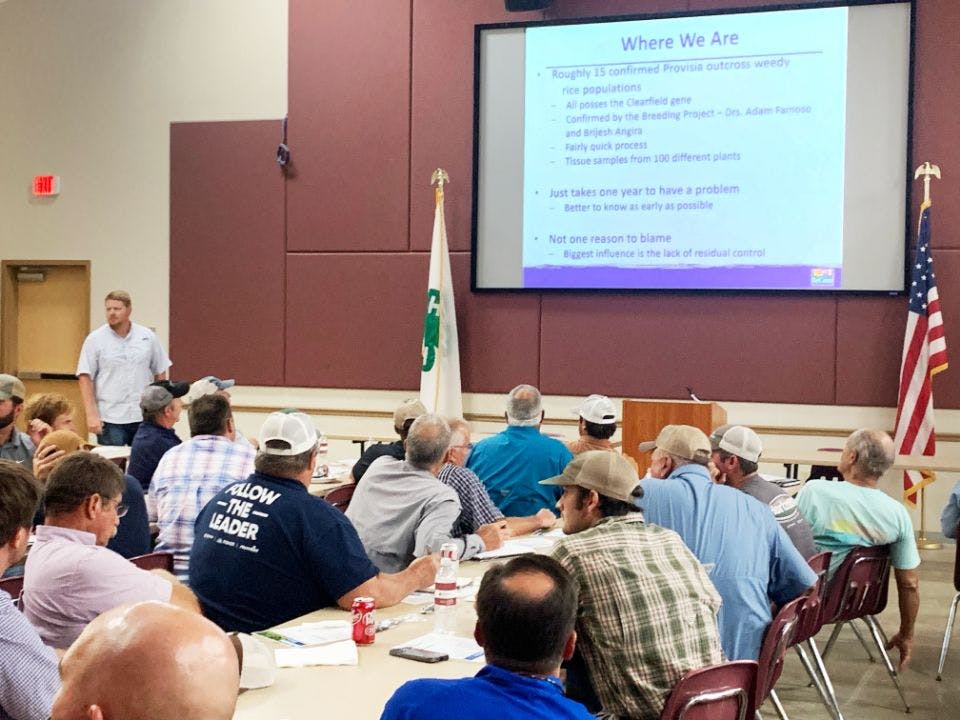PROVISIA® WORKING GROUP
Recommended BMPs for the Provisia Rice System
Recently, ag retailers from the Coastal region packed the Acadia Parish Extension Office auditorium in Crowley, Louisiana, to hear the Provisia® Working Group’s recommendations for best management practices (BMPs) for limiting the development of weedy rice outcrosses to the ACCase-inhibiting herbicide technology.
“The Provisia Rice System is the only thing we have right now for controlling weedy rice that has outcrossed with Clearfield® rice,” said Dr. Connor Webster, weed scientist at the LSU AgCenter. “If someone brought a new technology forward today, it would take several years before it could be commercially available. That’s why it is so important that we maintain this effective tool and prevent losing its effectiveness at the rate we are today.”

Dr. Connor Webster presenting Provisia BMPs to ag retailers at the recent Provisia Working Group meeting in Crowley, Louisiana.
Below are the recommendations Dr. Webster presented:
1.Use residual herbicides.
Command®, Prowl® and Facet® with grass activity control grass so that maximum coverage can occur with Provisia herbicide onto the weedy rice. Using residual herbicides for broadleaf activity PRE or DPRE (Sharpen®, Prowl, Facet, or Gambit® herbicides) will also reduce the need to tank-mix with the Provisia herbicide.
2.Be cautious of tank mixing herbicides that might lead to antagonism with your Provisia application.
Dr. Connor Webster, weed scientist at the LSU AgCenter, recommends having a least one application of Provisia alone, or two applications alone in a three-pass system. The size and population of weedy rice should always dictate follow-up applications.
3.Know which herbicides to mix – and which not to mix.
ALS-inhibiting herbicides can antagonize Provisia, although a second Provisia application 28 days after initial treatment can overcome much of the antagonism. Grasp® and Regiment® herbicides should be avoided for a tank mix, while sulfonylurea herbicides are better choices. For contact herbicides, Stam® herbicide severely antagonized Provisia activity, so propanil mixtures should be avoided. Basagran® and Sharpen herbicides antagonized Provisia activity at 14 days after treatment but were not antagonistic at 28 days.
4.Be diligent and clean fields up late-season.
If weedy rice is present, it needs to be taken out. This may mean using late-season herbicide applications, roguing, or spot spraying.
5.Consider crop rotation for success with Provisia rice.
Do not plant in the year following Clearfield rice or where an imidazolinone herbicide was used the previous year due to the risk of carryover damage from the herbicide.
6.Be aggressive in fallow ground and soybeans.
Use tillage and Roundup® herbicide with residuals to increase the time between applications.
Recommended Provisia Rice BMPs
- Use only Provisia herbicide in Provisia rice.
- Start clean, with burndown and/or tillage.
- Let the size and population of weedy rice dictate follow-up applications.
- Use residuals like grass and broadleaf herbicides for broad-spectrum control.
- Do not mix Provisia with herbicides that have the potential to be antagonistic.
- Apply to actively growing grasses, red rice and volunteer rice.
- Make at least two (but no more than three) Provisia herbicide applications no later than panicle initiation.
- Use proper carrier volumes of 10–15 GPA by ground and by air.
- Only mix when weedy rice and grasses are small.
- Clean equipment/combines.
Stewardship In Crawfish Production
- Don’t allow Provisia rice to go to seed in crawfish production.
- Don’t allow Provisia rice to go to seed in a non-rice year, including fallow or crawfish fields.
- Control weedy rice and red rice at pond edges with glyphosate or other chemical or cultural methods.
- Avoid using Provisia rice for green rice/crawfish forage production.
